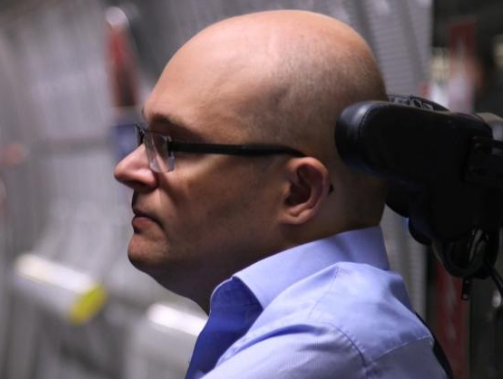
A Reuters journalist who was paralysed while on a war reporting assignment in Sri Lanka is sharing his story as he says the news industry is “crossing a threshold” of accessibility for disabled journalists.
Peter Apps, 37, broke his neck in 2006 after his minibus – which did not have a working seatbelt – crashed in Sri Lanka where he was working to cover the war between Tamil Tiger rebels and the government.
He was paralysed from the shoulders down as a result of his injuries, with only limited function in his left arm, and now has two carers.
Speaking to Press Gazette, Apps said he considers himself “one of the most disabled journalists on the planet”.
He also revealed that Reuters management had discussed, in his absence, whether his career was over after the accident, but then the company gave him a laptop with voice recognition software which he learnt how to use.
“If that hadn’t happened, I don’t think I would have got anywhere,” he said.
“There was a lot of goodwill in the agency, as well as a lot of ‘Jesus Christ this guy is screwed’, and I was also hugely lucky that in my two years overseas I’d carved out a very serious reputation.
“If it had been in my second week out in Johannesburg on my first assignment, which would only have been 25 months earlier, I think I would have had a lot more problems.”
Apps said BBC security correspondent Frank Gardner, who was shot six times by a terrorist gang in Saudi Arabia in 2004, leaving him paralysed from the waist down, had helped his own path.
“The mere fact that there’s someone else in a wheelchair doing stuff nudged people’s perceptions enough that he made it a lot easier for me to do it,” he said.
“I like to think we’re now crossing the threshold where a bright young 21-year-old with my level of injury could walk into a job at the BBC or Channel 4 and the fact that someone like me has done it would make that much more accessible.”
Despite an initial reticence from editors to have Apps on their teams, he was able to prove what he could do with the Thomson Reuters Foundation – the group’s charitable arm – before returning to the news agency.
He began as a disabled journalist on the emerging markets team and has since reported on defence and political risk. He is currently global affairs columnist at Reuters.
“I have done a hell of a lot but I’m bitterly angry about what happened to me and it damaged my career very badly,” he said.
“What I do get angry about is when people suggest that I’m somehow doing better than I would have been [without my injury] – I’m not.
“I do well, I do good stuff and I’ve got the jobs that I could get through raw skill and persistence and being good at my job, but it has been difficult.”
Apps said he has applied for a number of jobs outside Reuters but was never seriously considered “and that was simply down to the disability and the fear of extra costs”.
Apps was forced to enter a five-year legal battle with Reuters for compensation for his accident, over issues with the agency’s vehicle hiring practices, which was eventually settled.
Since then, Apps has been able to pay for his own care after being told his local council had no money left to keep him living independently, meaning he would have had to move into a nursing home.
The compensation has also given him funds to continue travelling. Of the 20 countries Apps has reported from during his career, more than half have been since his injury.
However his first work trip with Thomson Reuters Foundation after the injury “was sufficiently expensive that I’ve never been cleared to travel again”, he said.
Having to travel with carers had “completely killed” his career as a foreign correspondent, Apps said. “It’s not clear that it should have done, but it’s just the nature of the beast. That’s why I’ve moved into war analysis.”
Apps said his best work had been in Sri Lanka and southern Africa before his injury, although he was also proud of some of his long-form pieces written since – “the stuff that really interprets how the world is changing”.
“The truth is that the meat of an agency like Reuters is the sharp-edge reporting in places that are difficult, that’s where we earn our bread and butter, that’s where we do stuff that no-one else does,” he said.
“Nothing I’ve done since the injury has come close to being as rewarding as the stuff I did before. Although the power of doing it has arguably been more valuable.”
But, he added: “If I’m really honest, being paralysed from the shoulders down does take the shine off any career that’s done that to you a bit.”
Apps now wants to speak more openly about his injury and his experiences and wrote a piece for Reuters to coincide with the 12th anniversary of the accident last month.
He said: “I think my story is valuable. It’s been a very interesting life and I’m trying to do more on documenting that and drawing out lessons from it.
“If you read everything I’ve written in the last 12 years you realise that the most obvious thing about it is that, aside from about eight pieces, you wouldn’t know I was disabled.
“That’s fine, you want to be able to punch at the same level as able-bodied people, but the truth is it does give me a range of useful experiences and I’d like to engage with that a bit more.”
Picture: Reuters TV/ via Reuters
Email pged@pressgazette.co.uk to point out mistakes, provide story tips or send in a letter for publication on our "Letters Page" blog
